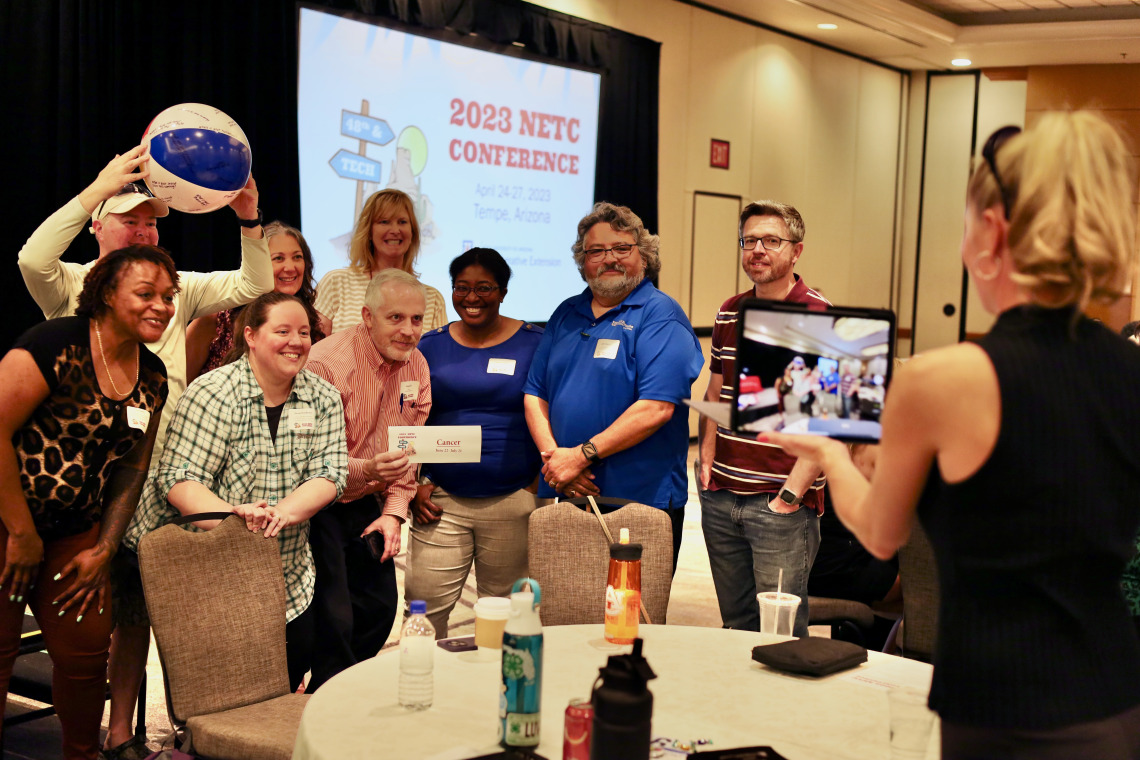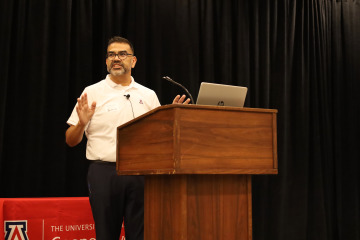Extension Technology Experts Gather in Tempe, Arizona to Network, Boost Collaboration
The 2023 National Extension Technology Community Conference was aimed at bolstering cooperation and expanding the network of technology professionals in Extension.

The 2023 NETC Conference opened with an ice-breaker that helped everyone get to know each other.
Brad Poole
Cooperative Extension technology professionals from across the nation gathered in Tempe, Arizona recently to compare notes, learn from each other, and find ways to help their state organizations use technology to grow and succeed in a fast-changing world.
University of Arizona hosted this year’s National Extension Technology Community Conference, offering three days of breakout sessions, networking opportunities, and above all else, camaraderie for more than 100 Extension tech experts.
“Yes, you get important information from each presentation, but some of the biggest value is the relationships that you make between the sessions. Common understanding, empathy, ‘Hey, I know what it’s like to work in an Extension unit. I understand the challenges we have,’” said Ed Zuech, NETC President and Information Technology Director at Penn State University College of Ag Sciences.

Dominic Rodriguez, University of Arizona Cooperative Extension Associate Director for Operations, welcomed more than 100 tech experts and other to the conference.
Brad Poole
Hourlong breakout topics included using Zoom, social media and marketing communications, video editing, Internet of Things, developing a “crash plan” for when data systems fail, crop monitoring data analysis, and writing policies and procedures.
Mike Crimmins, University of Arizona Associate Specialist in Extension and Associate Professor of Climate Science, offered a keynote talk on the use of technology in assessing climate change, and Collette Brown-Rodriguez, Director of Community and Tribal Relations with clean energy company Avantus, gave a second keynote address on her experiences in tribal extension.
Two breakout sessions highlighted ChatGPT, an artificial intelligence algorithm that is gaining popularity for writing copy and code. The new technology allows lightning-fast output based on minimal input. It is widely touted as a time-saver, when properly applied.
“It seems like every day there’s another article, another example, another concern – you name it. The flood gates have opened on this,” said Greg Johll, IT Director at University of Wisconsin Division of Extension, who led one ChatGPT session. “What I wanted to do is just make sure we start having a conversation in Extension about ChatGPT.”
Extension staff have used the algorithm to summarize academic papers, write website code, and craft email. Discussions like the one at NETC can help Extension tap potential and avoid pitfalls of the emerging technology, Johll said.
Pete Vergot, District Director of the University of Florida Institute of Food and Agricultural Sciences Extension, used ChatGPT to help draft his retirement letter.
“I put in my CV, and I gave it some important dates – the date I started and the date I planned to retire, and it did a pretty good first draft. You can’t take everything. You have to have some human interaction. I added some things, and then I had to do a second draft, then it refined that,” Vergot said.
The algorithm completed the letter in seconds, he said.
During Johll’s hourlong ChatGPT session, attendees highlighted several uses for AI technology, including removing static from audio recordings and crafting social media posts.

Eleven NETC veterans were inducted into the new NETC Hall of Fame.
Brad Poole
Eleven NETC members were honored as the inaugural members of the NETC Hall of Fame: Bill Murphy or Virginia Tech, Paul Stittler of Texas A&M University, Art Hussey of Penn State University, Duane Rigsby of Ohio State University, Jacki Weikert of Penn State, Brian Webster of Iowa State University, Pete Vergot of University of Florida, Brian Watson of University of Georgia, Pete Flores of Texas A&M, John Dorner of North Carolina State University, and Rusty Presley of Auburn University.
Technology is at the heart of Extension program delivery, and gatherings like the NETC conference translate directly into better programming. The gathering helps Extension meet stakeholders where they are – whether it’s minimum or maximum technology, Zuech said.
“As we look at who we support, we have some people who still want to bring their legal pad, they want to sit down and take notes and talk face to face. Then we have the other end of the spectrum, people who want to be able to look at that information where they want, when they want, in any medium they want,” he said.
NETC offers a chance for diverse technology professionals to put their heads together, whether they specialize in networking, data analytics, software, or a combination of all of those, said Dominic Rodriguez, Associate Director for Operations at University of Arizona Cooperative Extension.
“Once you get an idea that you heard from somebody here, you can take that back to your school and say, ‘Hey, let’s try it this way.’ It’s about just having that connection, sharing those best practices, what are the hot trends and how can we incorporate that into our solutions?” Rodriguez said.
He hopes the conference will foster increased collaboration among technology staff, program administrators, and grant writers. Having the tech team onboard early in a program or project’s launch can lead to smoother delivery of services than inviting them to the table later, he said.
“It’s really, really difficult to retro fit delivery. Bring tech in early. I think having conversations with these technology experts here is going to drive better solutions for Extension programming,” Rodriguez said.
Zuech agreed.
“My goal is that these individuals come here and they feel valued, they’ve learned something, and they can take that back and better serve Extension in some fashion. Whatever their role is, whatever their customers’ needs are, they can take something and make that better.”
